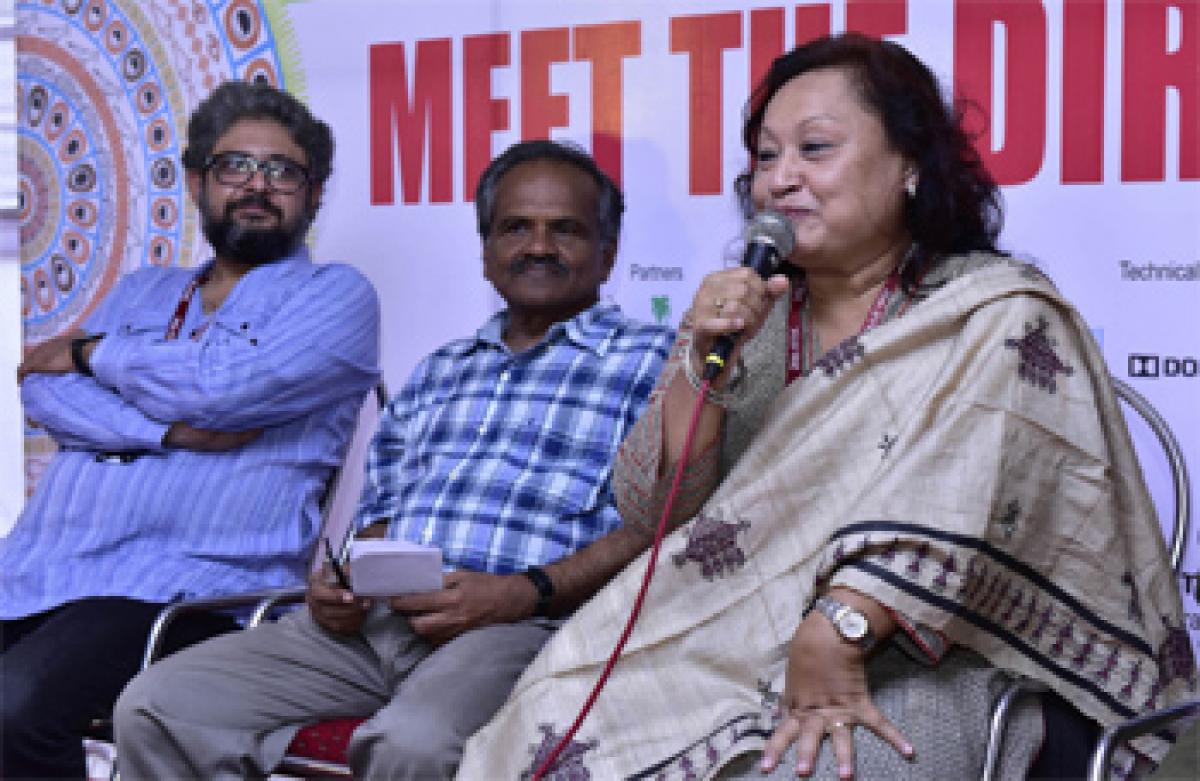Live
- Vizag mafia rules sand ramps in Srikakulam district
- Unselfishness is a Lie
- ICTPL welcomes maiden vessel MV KSL Fuyang
- BJP leaders mock Rahul's speech
- Analysing Happiness
- Two-day ToT organised for trainers
- Savarkar preferred Manusmriti to Constitution: Rahul
- Daily Horoscope for 15 December 2024: Embrace Today’s Insights of Your Zodiac Sign and Unlock Your Potential.
- Beyond The Flames
- CM warns officials of stringent action
Just In

x
Highlights
For some, it\'s fund crunch, others complain of an inherent gender bias, superfluous criticism or the censors board\'s unnecessary, nit-picking scrutiny. Parallel cinema is besieged with numerous problems, complain some of its most-lauded directors.
For some, it's fund crunch, others complain of an inherent gender bias, superfluous criticism or the censors board's unnecessary, nit-picking scrutiny. Parallel cinema is besieged with numerous problems, complain some of its most-lauded directors.
Iranian filmmaker Dariush Mehrjui, a proponent of new age cinema in his country, slammed modern film critics for being engrossed in marginal issues, instead of exploring layers of meaning in a work.
"Art feeds on art, 99 percent of works are inspirations from other works. How you transfer a work into screenplay and then interpret it as a film is what is important, not that you have chosen one literary work or another," said the director, who was recently conferred with the lifetime achievement award at the International Film Festival of Kerala (IFFK).
Mehrjui, whose inspirations were Italian directors Federico Fellini and Luchino Visconti, French directors Jean-Luc Godard and Robert Bresson, and India's 'showman' Raj Kapoor, features strong women characters in his films and is outspoken against their forced social oppression.
"I wanted to show that women are not weak elements, but are individuals with strong personalities, who can say no to men," he said.
Noted Indian filmmaker Adoor Gopalakrishnan said cinema's relationship with literature was inseparable.
"The golden age of Malayalam cinema was when our literary classics, such as the works of Thakazhi Sivasankar Pillai and Vaikom Muhammad Basheer, were adapted for the big screen.
"When I graduated from the Film and Television Institute of India (FTII), I was adamant that there was no connection between cinema and literature. But both are derived from life," said the 74-year-old filmmaker known for award-winning works like "Kathapurushan", "Nizhalkkuthu", "Mathilukal", "Mukhamukham" and "Kodiyettam".
M.S. Sathyu, whose acclaimed "Garam Hawa" was funded by the Film Finance Corporation (now the National Film Development Corporation) said young filmmakers often face funding problems, and it was unfortunate that the NFDC does not fund films unless they have a good chance of making profit.
"This is a wrong policy, because the idea is to develop an industry. We need to create a corpus fund that can be used by upcoming filmmakers," said the 85-year-old director.
Award-winning Assamese filmmaker Manju Borah, who won accolades for films like "Baibhab", "Anya Ek Yatra", "Akashitarar Kathare", "Laaz" and "Joymati", raised the issue of bias often faced by women in arts.
Noting she struggled to evolve as a director in a male-oriented sector, she said: "I have been always isolated by my crew members based on gender. However, I preferred to be part of everything during the shoot as it was my film."
Bengali director Debesh Chatterjee, whose "Natoker Moto" (Like a Play) is based on the real-life story of a late theatre artist much ahead of her times, feels society "always has a wrong perspective on female artistes thriving in the fields of arts and culture".
Nepali director Min Bahadur Bham lamented that the younger generation in his Himalayan nation have lost interest in cinema, and filmmakers remained fixated on Bollywood.
"In Nepal, cinema is only watched by retired old people whereas the younger crowd spend their time in pubs and other activities," he said.
Bengali director Satarupa Sanyal said it was very difficult to market "offbeat and parallel" films and harder to convince producers to shell out money.
She noted she had approached various people for producing 'Onyo Opala', the story of a young girl marrying a transgender, but in vain and finally decided to produce and distribute it herself.
Biju Damodaran, director of "Valiya Chirakulla Pakshikal" ("Birds With Large Wings"), about people exposed to pesticide endosulfan in Kerala's Kasaragod, stressed cinema cannot ignore facts or directors mute criticism of society when it takes a wrong turn.
Satish Babusenan, whose Malayalam film "Chaayam Poosiya Veedu" ("The Painted House"), which has three nude scenes, and was screened at IFFK without a censorship certificate, said cinema was an artistic medium and not just entertainment, the censor board should not infringe on the artiste's freedom of expression or creativity.
His brother and co-maker Santosh said fear of cost overruns deter producers from approaching courts against the censor board's ruling, and if producers stay united against the censor board, it will shed its "rigidity".

Next Story
More Stories
ADVERTISEMENT
© 2024 Hyderabad Media House Limited/The Hans India. All rights reserved. Powered by hocalwire.com







